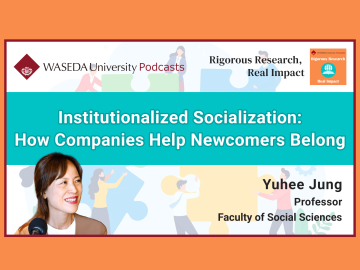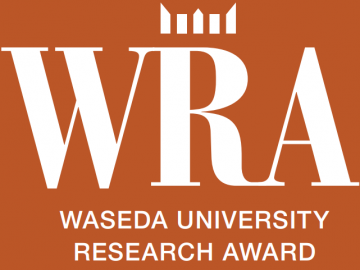Waseda University established the Waseda Research Award in 2014 to promote innovative research at the university and disseminate its results around the world. The award honors scholars spearheading large-scale research projects, as well as emerging researchers whose work has had significant impact abroad. The award has two categories: Large-Scale Research Project and High-Impact Publication. Recipients of the award receive a certificate and a prize of 500,000 yen for the large-scale research project catgory, and 300,000 yen for the high-impact publication category.
Below, we proudly present the recipients of the 2020 Waseda Research Award.
Recipients of the 2020 Waseda Research Award
Large-Scale Research Project Category
*in alphabetical order
- Yoshimichi OHKI
Assessment of Electrical Equipment Ageing for Nuclear Power Plants - Kiyoshi SAITO
Development of Effective Assessment Methodology for Next-Generation Air Conditioning Technology Using Low GWP Refrigerants - Nozomu TOGAWA
Research and Development of a Common Software Platform for Ising Machines
High-Impact Publication Category
*in alphabetical order
Tomoyasu IIYAMA
A historian of Song-Yuan China, Professor Tomoyasu IIYAMA deserves commendation for a myriad of reasons. First of all, his innovative work on stone stele inscriptions provides keen insight into what traditional sources do not convey about Yuan North China. Iiyama’s findings on lineage, patronage, and political power reveal key differences between northern and southern China, and identify new patterns of negotiation between dynastic authority and local elites at a time of deep political change. These have all made exciting contributions to his field. Iiyama has garnered international attention through leading journals, edited volumes, and international conferences where he, in thewords of one top specialist, “has made us rethink north China during the twelfth-fourteenth century.”Just as importantly, Iiyama’s efforts to share his research internationally by publishing in Japanese, English, and Chinese are admired and appreciated by colleagues around the globe. Sinologists everywhere must be able to read Japanese, as the field relies heavily on secondary literature written in Japanese by Japanese scholars of China. By making his work accessible in multiple languages, Iiyama performsan invaluable service to his field and thus embodies the very spirit of the Waseda Research Award.
W. L. Quint Oga-Baldwin
Japan has a long history of foreign language education and research, with qualitatively enriched and multifaceted directions of research, and the accumulation of data and knowledge in this field is both qualitatively and quantitatively abundant. Against that background, the fact that the candidate continues to publish novel advanced research results related to English education, with a focus on motivation in English learning, in international journals that are highly evaluated by academic societies is the main reason for his receiving this award. The effects of motivation in English learning have long been a subject of research, but English education in Japanese public elementary schools can be considered a subject still in its infancy. The materials and data the candidate has provided in this field, along with knowledge derived from them, will be of great value not only to researchers but also to teachers working at elementary schools. Japan has somewhat unique characteristics with regard to foreign language education, so disseminating related research results overseas in English is of great significance, and we expect the results of foreign language education and research across the related fields of education, psychology, and applied linguistics to be presented in the future.
Regis GUEGAN
Regis Guegan is conducting some research on colloidal systems based on surfactant mixed with particles called inorganic nanosheets, derivatives from the peeling of layered inorganic materials. His research and development on the colloidal chemistry is among the most advanced in the world, with the obtention of original research results on hybrid systems combining inorganic nanosheets and surfactants. Since his time in Europe, he has promoted many joint research projects involving researchers in Japan and European countries, and he has published many papers in well-known English journals. He is also conducting international joint research involving Japanese researchers and students, and he is attracting attention as a young international researcher who contributes to the formation of networks between Japan and other countries. His research results are expected to be applied to many fields in the future, including optics, semiconductors, and biosensors. It is highly likely that this will have social impacts in the future, with both academic and practical implications from a physicochemical point of view.
Ramesh Sunam
The recipient, Dr. Ramesh Sunam, has produced eye-catching work on the human geography of rural poverty and global migration involving Nepal. His innovative, ethnographic approach adds welcome disciplinary diversity to the field of development studies. This methodology has allowed Sunam to vividly illustrate how rural villages in Nepal and elsewhere have transformed, witnessing migration and poverty reduction while also facing increasing stratification as a social consequence. His research produces a nuanced narrative that helps to humanize macro trends. The level of Sunam’s research output is admirable for an early-career scholar. Yet, quantity has come with no sacrifice in quality; his work has appeared in top international journals in the field and has been cited extensively by others. In addition to being academically rigorous, Sunam’s work on migration and agrarian change offers practical lessons for policy formation, which he generously shares through open-access blogs and policy briefs. Sunam is also embedded in a network of scholars across Asia and Australia, which brightens his prospects for further international collaboration. In sum, his superior combination of recent productivity, international recognition, and future promise makes Sunam a worthy recipient of this prize.
Hun Chung
Dr. Hun Chung specializes in Political Philosophy, Formal Theory, and PPE (Philosophy, Politics, and Economics.) He has actively employed and applied the formal tools of modern game theory and social choice theory to answer fundamental questions in political philosophy, such as distributive justice, political/democratic legitimacy, political stability, liberal rights, as well as the reinterpretation of the classical texts in the history of political philosophy. The reason Dr. Chung’s research is internationally regarded as original and innovative is that he is one of the pioneers in applying mathematical and methodological tools of the social sciences (such as political science and economics) to answering normative questions in political philosophy which has traditionally been regarded as primarily a field in the humanities. Furthermore, he has published more than 10 papers in international peer-reviewed journals within the last 5 years. Many of them are in top journal in the field. Dr. Chung’s productivity is quite remarkable and unusual. Because of their highly theoretical nature, his works in political philosophy may not have an immediate impact on society or industry. Nevertheless, given that his research has been influential in his field, we believe that his research will have a gradual but significant impact on society by changing people’s ways of thinking about political and social institutions. We hope that with Dr. Chung’s interdisciplinary research, more people will recognize the importance of studying and combining political philosophy, political science, and economics together.
Chiharu TOKORO
The greatest value of Prof. Tokoro’s research lies in its skillful blending of various disciplines, such as resource engineering, chemical engineering, materials science, and numerical analysis, and its use of wide-ranging technologies from these disciplines toward the goal of environmental conservation and the creation of a sustainable circular economy. Her research, which is both pioneering and innovative, has been highly praised by researchers in related disciplines and has received numerous awards at academic conferences. Prof. Tokoro’s international visibility is also worthy of special mention. In addition to conducting collaborative research with scholars at universities and research hubs in North America, Europe, Asia, and Africa, she has published numerous joint papers with researchers at institutions around the world and organized various international conferences. Prof. Tokoro’s dramatic increase in research output and citations over the past five years owes much to the pioneering and innovative nature of her research and her involvement in international collaborations and is deserving of high praise. Notably, practical application is the goal of all her work related to the development of technologies for recycling valuable materials via low environmental impact processes. Thus, these technologies have high potential for social implementation. The spillover effects from Prof. Tokoro’s research will increase in scope as demand continues to grow for research that contributes to realizing a sustainable society through the adoption of the SDGs and other initiatives.
Tadao HOSHINO
As an expert in econometrics, Prof. Hoshino conducts research centered on microeconometric theory with a focus on the estimation of social interaction models and semiparametric estimation of models with endogeneity problems. Whereas most econometrics research tends to focus narrowly on one problem, his research simultaneously deals with multiple issues contained within each empirical problem. The originality of this approach has been highly praised. Prof. Hoshino applies the econometric theory that he has developed to real data and performs sophisticated empirical analyses on subjects such as education and crime that have important implications for policy. The results of his research have been published in top-tier econometrics journals such as the Journal of Econometrics and the Journal of Business & Economic Statistics and have been presented at numerous international conferences. Prof. Hoshino has a remarkable international presence within his field, and he has conducted joint research with well-known international researchers, successfully creating an international research network. For the accomplishments described above, Prof. Hoshino richly deserves this award and can no doubt be expected to achieve even greater things in the future.
Ryoji MATSUOKA
Prof. Matsuoka conducts empirical research on inequality in education, which is one of the major themes in sociology of education. He has published numerous papers in top-tier international journals in this field, including Comparative Education Review, British Journal of Sociology of Education, and Social Science Research. This level of accomplishment is rare among Japanese scholars in sociology of education, a fact that is further shown by Prof. Matsuoka being honored with the International Award by the Japan Society of Educational Sociology in 2015. His papers have also received a large number of citations for this field, indicating the international impact of his work. In Japan, his book titled Inequality in Education: Social Class, Region, and Educational Attainment (Chikuma Shobo) has sold over 50,000 copies, which is unprecedented for a book based on scholarly research in this field, and it has also been widely referred to in the mass media. These and other activities have led Prof. Matsuoka to serve as a member of the Working Group on Elementary and Secondary Education of the Education Rebuilding Implementation Council (Office of the Prime Minister). It is anticipated that Prof. Matsuoka’s work will have a growing impact on education policy in the future.








